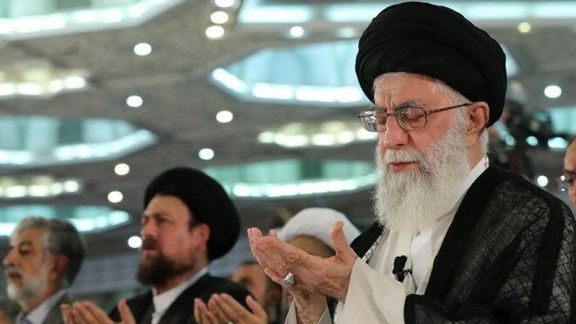Tehran Daily Says Hard To Revive JCPOA, Suggests Direct Talks With US

Recent media reports in Iran indicate that local observers are increasingly convinced the revival of the 2015 nuclear deal (JCPOA) is impossible.

Recent media reports in Iran indicate that local observers are increasingly convinced the revival of the 2015 nuclear deal (JCPOA) is impossible.
The latest report in reformist daily Shargh on the issue, which has also been carried by other media outlets such as Iran Diplomacy and Rouydad24, says some officials have been considering alternative solutions.
Shargh relying on recent statements by several Iranian politicians and pundits said that perhaps the best route to resolve the nuclear dispute is direct talks between Iran and the United States, something that Supreme Leader Ali Khamenei has forbidden.
While several Iranian and international observers are still considering Khamenei's latest reference to "heroic flexibility"as an allusion to the feasibility of an agreement with the West, his reference to the Shiite principle of Taqiyyah based on which Shiites can prudently hide their real beliefs and goals, and his explanation that heroic flexibility is "a way of circumventing a rock on the way of your progress" put an end to all hopes about a possible softening of Iran's stances.
In other words, for Khamenei nuclear talks are a means to neutralize foreign opposition while following his real objectives.
As a result, some observers characterized Khamenei's rhetoric as a double-edged guidance to Iranian diplomats. It is characteristic of Khamenei to make statements in order to evade responsibility if his suggestions lead to a failure and to claim victory if they happen to gain something for the Islamic Republic.

In the meantime, Iranian officials including Foreign Minister Hossein Amir-Abdolahian make occasional statements about secret talks with the United States. The latter has repeatedly refuted such statements and labelled them as lies.
In one of the latest developments, five years since the collapse of the JCPOA nuclear talks, dozens of ex-US diplomats have called to end diplomatic overtures to Tehran.
The report in Shargh said that boosting of Iran's nuclear activities since 2021 is one of the reasons why observers believe that the JCPOA can no longer be revived. Another obstacle is Iran's insistence on its financial demands before returning to the negotiations. However, a key problem is that the deadlines to lift the embargo on Iran's missile development and nuclear activities respectively in October 2023 and 2025 are getting closer quickly.
Shargh noted that the current 5+1 has no similarity to the P5+1 in 2015. There is a vast divide between Russia and the four Western partners of the JCPOA and the relations between China and the United States are no longer friendly. Changes have even occurred between the four Western partners. Last March the three European partners demanded an IAEA resolution against Iran, but the United States disagreed with them, which was a reversal of roles compared to the past. In the meantime, Iran's involvement in Russia's war against Ukraine has also changed many things. No one in the West supports the lifting of sanction on Iran, and doing so will be costly for Western governments.
In this situation, the Biden Administration has said that "The JCPOA is no longer on the agenda, however, the problem with Iran can be solved only through diplomatic ways." The policy of "neither JCPOA, nor crisis" just gives Biden one less subject to worry about. At the same time, some Western officials have been talking about an interim agreement or "less for less," Iran has not yet agreed with that.
Meanwhile, Israel's insistence on posing a "valid military threat" against Iran's nuclear program and two joint military exercises with the United States in November 2022 and January 2023 have made the matter even more complicated.
Under the circumstances, according to experts quoted by Shargh, Iran's constant rhetoric about its readiness to return to the JCPOA and its continued efforts to boost its nuclear capabilities exert pressure on the West. At the same time, unwanted consequences are also probable in the absence of a dialogue.